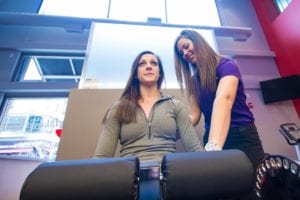What is a herniated disc?
Herniated discs are an injury that can occur in the spine. The spine is made up of 33 bones (vertebrae) with cushions in between each bone called the intervertebral discs. These discs are made up of two components: an outer portion which is more firm and rubbery (annulus fibrosis) while the inside of the disc is made up of a more jelly-like substance (nucleus pulposus). A herniated disc can develop over time or can happen quickly from stress placed on the spine. In either case, a disc herniation is when the inside jelly portion of the disc is allowed to protrude out of the outer portion of the disc.
How do I know I have one (typical signs and symptoms)?
Some of the things that you might feel if you have a herniated disc include: inability to bend, numbness/tingling, weakness, limping, increased pain when coughing, inability to remain in one position for a long period of time.
How can physical therapy help?
Physical therapy can help with herniated discs by performing an evaluation to determine where the pain is coming from and assist with decreasing pain and improving your function. Your physical therapist will work to help improve posture, flexibility, strength, and endurance to allow you to return to your daily/recreational activities without pain.
How do I find out about my issue?
In order to determine if a herniated disc is the reason that you are having your symptoms, your physical therapist performs tests and measures to look for poor posture, weakness, numbness, decreased flexibility, loss of reflexes and difficulty walking. If your therapist finds any of these issues, then they will begin treatment to help decrease pain and get you back to your daily activities. Your therapist will always be in communication with the physician and if they think additional testing may be warranted due to symptoms found in the exam they will let your physician know.
Christopher Stull PT, DPT
If you would like some more in-depth information about herniated discs follow the link below:
https://www.choosept.com/symptomsconditionsdetail.aspx?cid=79ef56df-780e-4ad0-963f-94364404125a

